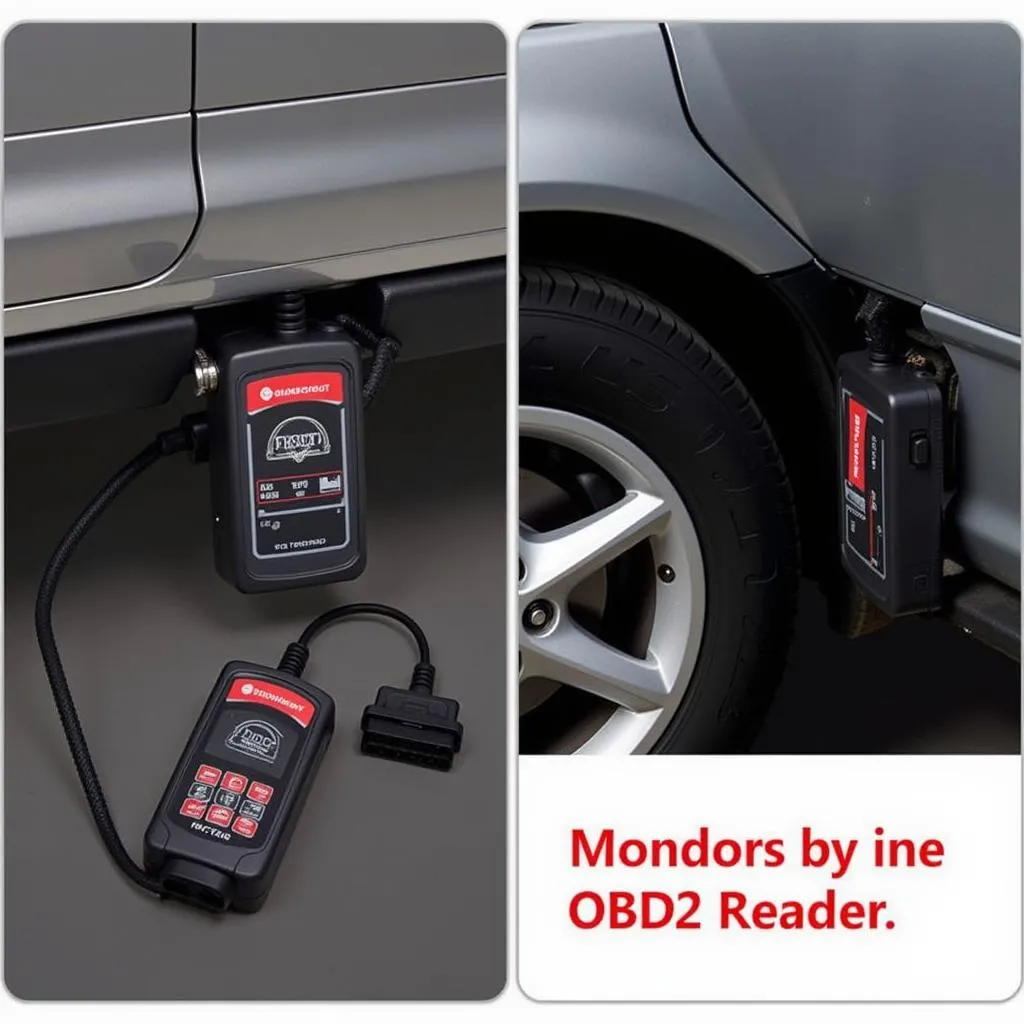OBD readers have revolutionized car maintenance and diagnostics, empowering car owners to understand and address vehicle issues. But with countless options available, choosing the best OBD reader for your needs can feel overwhelming. This comprehensive guide will explore everything you need to know about OBD readers, helping you make an informed decision.
Understanding OBD Readers and Their Functionality
Before diving into the selection process, let’s clarify what an OBD reader is and how it can benefit you. OBD stands for On-Board Diagnostics, a standardized system in modern vehicles that allows access to a treasure trove of data about your car’s engine, transmission, emissions system, and more.
An OBD reader, also known as an OBD2 scanner, acts as a key to unlock this information. By plugging into your car’s OBD2 port (typically located under the dashboard on the driver’s side), the reader retrieves diagnostic trouble codes (DTCs) stored in your vehicle’s computer. These codes pinpoint potential issues, ranging from minor sensor malfunctions to more serious engine problems.
Why You Need a Best OBD Reader
Investing in the best OBD reader offers numerous benefits, making it an invaluable tool for any car owner:
- Early Problem Detection: Identify potential issues early on, preventing costly repairs down the line.
- Cost Savings: Avoid unnecessary trips to the mechanic by diagnosing problems yourself and confirming if a mechanic visit is truly necessary.
- Enhanced Car Knowledge: Gain a deeper understanding of your vehicle’s health and performance.
- DIY Maintenance: Perform basic maintenance tasks yourself, such as resetting the check engine light after repairs.
- Improved Fuel Efficiency: Monitor fuel economy and identify factors affecting it.
Types of OBD Readers
OBD readers come in various forms, each catering to different needs and budgets.
1. Basic OBD2 Scanners:
These entry-level devices are budget-friendly and primarily read and clear basic DTCs. They are suitable for car owners who want a simple way to check engine lights and perform basic diagnostics.
2. Bluetooth OBD2 Readers:
These wireless scanners connect to your smartphone or tablet via Bluetooth, offering greater convenience and portability. They provide more detailed diagnostic data, including live sensor readings, and often come with mobile apps for enhanced functionality.
3. Professional-Grade OBD2 Scanners:
These advanced scanners, often used by mechanics and professional technicians, offer comprehensive diagnostic capabilities, including advanced coding, programming, and bi-directional control. They are the most expensive option but provide unparalleled functionality for in-depth diagnostics and troubleshooting.
Choosing the Best OBD Reader: Key Factors to Consider
To select the best OBD reader for your specific needs, consider the following factors:
1. Vehicle Compatibility:
Ensure the reader is compatible with your vehicle’s make, model, and year. While most modern vehicles use the standard OBD2 protocol, some older models or specific car brands may require specialized adapters or scanners.
2. Functionality:
Determine your desired level of functionality. If you only need to read and clear basic codes, a basic scanner might suffice. However, if you want access to live data, advanced diagnostics, or specific features like ABS or airbag system scanning, opt for a more advanced model.
3. User Interface:
Choose a reader with an easy-to-navigate interface, whether it’s a standalone device with a built-in screen or a mobile app-based solution.
4. Data Presentation:
Consider how the reader presents data. Some offer simple code readouts, while others provide graphical representations, real-time gauges, or customizable dashboards for easier data interpretation.
5. Additional Features:
Explore additional features that enhance functionality or convenience, such as:
- Data Logging: Record and track data over time to monitor performance trends.
- GPS Tracking: Some scanners offer GPS tracking for location-based diagnostics or trip logging.
- Smartphone Integration: Seamlessly integrate with your smartphone for data sharing, remote diagnostics, or cloud storage.
- Manufacturer-Specific Coverage: Consider scanners with enhanced coverage for specific car manufacturers if you own a vehicle from a particular brand.
OBD Reader for Audi
Top OBD Reader Recommendations
To simplify your search, here are some highly-regarded OBD readers across different categories:
- Best Overall: Bosch Car Code Reader
- Best Budget-Friendly: ANCEL AD310
- Best Bluetooth Option: Best Bluetooth OBD2 Reader
- Best for Professionals: Autel MaxiCOM MK908P
OBD2 BMW Scanner
Conclusion
Choosing the best OBD reader empowers you to take control of your car’s health, saving you time and money in the long run. By understanding the different types, features, and factors to consider, you can find the perfect OBD reader to unlock the secrets hidden within your vehicle’s onboard computer. Empower yourself with knowledge and take the first step towards proactive car maintenance today.
FAQs
1. What is the difference between OBD and OBD2?
OBD (On-Board Diagnostics) is a general term for vehicle diagnostic systems, while OBD2 is a standardized protocol introduced in 1996. Most cars manufactured after 1996 in the US and after 2001 in Europe use the OBD2 standard.
2. Can an OBD reader fix my car?
No, an OBD reader is a diagnostic tool, not a repair tool. It helps identify potential issues but doesn’t fix them.
3. Will using an OBD reader void my car’s warranty?
No, using a reputable OBD reader won’t void your car’s warranty. In fact, it can help you address issues early on and potentially prevent warranty claims.
5. Can I use any OBD reader on my car?
While most modern cars use the standard OBD2 protocol, it’s crucial to check compatibility with your specific vehicle’s make, model, and year to ensure proper functionality.
6. How often should I use my OBD reader?
It’s a good practice to scan your vehicle periodically, especially if the check engine light illuminates or you notice any performance issues.
7. Can an OBD reader tell me when my next oil change is due?
Some advanced OBD readers can provide maintenance reminders based on mileage or driving habits, but this functionality varies depending on the model.



